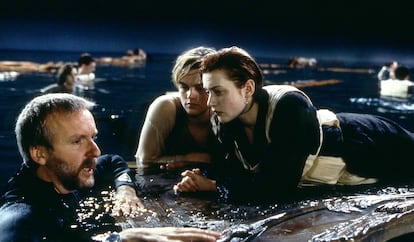Could Jack in ‘Titanic’ have been saved? The ‘biggest controversy in modern cinema’ is settled
After 25 years of speculation, movie director James Cameron has participated in a scientific experiment that attempts to clear up doubts over the fate of Leonardo DiCaprio’s character

Filmmaker James Cameron has spent a quarter-century defending the decision for Jack (Leonardo DiCaprio) to sink in the freezing waters of the North Atlantic in his cinematic masterpiece Titanic. “He needed to die,” the director said.
The death remains the subject of debate for many fans of the iconic film, who refuse to accept that the dramatic twist is what makes the blockbuster so immortal. The question of whether Jack could fit on the wooden board next to Rose (Kate Winslet) remains as relevant as it did in the winter of 1998. So the man behind the decision – either to honor the film’s 25th anniversary cinematic re-release on February 10, to promote his new film Avatar: The Way of Water, or just because he was fed up – decided to join the “silly conversation,” as he has called it, and solve contemporary film’s most controversial question once and for all.
National Geographic’s recent documentary Titanic: 25 Years Later with James Cameron pays tribute to the award-winning film with a scientific study, led by the director himself, that simulates the conditions that Jack and Rose would have confronted that night of April 15, 1912. With the help of a university laboratory that specializes in the effects of cold on the human body, Cameron created an identical replica of the board from the film and hired two stunt doubles, Josh Bird and Kristine Zipfel, with the same age, height and weight as his protagonists during original filming. Sensors were placed all over their bodies, they wore similar clothing and they repeated the dialogue from the film. Submerged in a pool, and extending each phase to compensate for the impossibility of subjecting the actors to such low temperatures, the team put four possible situations to the test.
In the first, both climbed onto the board to disprove the first myth: yes, both of them fit perfectly on it. However, their combined weights would sink the wood in the icy waters, provoking the couple’s death. Their possibilities of survival increased on the second attempt, in which the doubles placed their upper bodies on the board to keep their vital organs out of the ocean. The option didn’t convince Cameron, who claimed that Jack and Rose’s combined exhaustion, after surviving a shipwreck, would prove an obstacle to maintaining the position for a long time. So they submitted the doubles to extreme physical exercise to repeat the tests.
In the fourth scenario, Rose gives her life vest to Jack once she climbs onto the plank, giving the young man a few hours to try to stay alive.
“He’s stabilized, he got into a place where if we projected that out, he just might have made it,” the director admitted, “But there’s a lot of variables.” Science can’t evaluate the motivations of DiCaprio’s character, who may not have accepted Rose’s offer of the life vest. “I think his thought process was, ‘I’m not going to do one thing that jeopardizes her,’ and that’s 100% in character,” Cameron says, after lamenting his choice of props during the filming: “I should have made the raft smaller.”

Could Jack and Rose have had a happy ending?
The actors have also found themselves bombarded with questions about the scene for decades. In the case of DiCaprio, not even co-stars like Brad Pitt and Margot Robbie, who has called the scene “the biggest controversy in modern cinema,” have been able to elicit anything beyond a “no comment.” “Could you have squeezed in there?” Pitt asked DiCaprio during a promotional interview for Once upon a time in Hollywood. Winslet, on the other hand, with her characteristic good nature, responds to the question politely. In December, on the podcast Happy Sad Confused, she answered, “He could have fit on that door, but it would not have stayed afloat. It wouldn’t.”
The controversy about Titanic’s ending has fed anticipation about the film’s return to theaters this month. The modern Romeo and Juliet will once again board the ship of dreams in a remastered 3D version. The glasses will hide our tears when we once again hear “if you jump, I jump,” or watch how Jack drowns before our three-dimensional eyes. And let’s not lie to ourselves: unhappy endings are always more memorable.
Sign up for our weekly newsletter to get more English-language news coverage from EL PAÍS USA Edition
Tu suscripción se está usando en otro dispositivo
¿Quieres añadir otro usuario a tu suscripción?
Si continúas leyendo en este dispositivo, no se podrá leer en el otro.
FlechaTu suscripción se está usando en otro dispositivo y solo puedes acceder a EL PAÍS desde un dispositivo a la vez.
Si quieres compartir tu cuenta, cambia tu suscripción a la modalidad Premium, así podrás añadir otro usuario. Cada uno accederá con su propia cuenta de email, lo que os permitirá personalizar vuestra experiencia en EL PAÍS.
¿Tienes una suscripción de empresa? Accede aquí para contratar más cuentas.
En el caso de no saber quién está usando tu cuenta, te recomendamos cambiar tu contraseña aquí.
Si decides continuar compartiendo tu cuenta, este mensaje se mostrará en tu dispositivo y en el de la otra persona que está usando tu cuenta de forma indefinida, afectando a tu experiencia de lectura. Puedes consultar aquí los términos y condiciones de la suscripción digital.









































